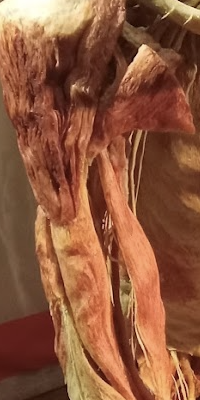January 26, 2024 — I went to a plastination exhibit for the first time last week. I got so much out of the visit and highly recommend checking one out if you haven't. I salute Gunther von Hagens, who pioneered the technique. You probably learn more anatomy walking around a plastination exhibit for 2 hours then you would learn in 200 hours reading anatomy books. There are a number of new insights I got from my visit, that I will probably write about in future posts, but one insight I hadn't thought about in years is how much humans and animals look alike once you open us up! And then of course I was confronted again with that lifelong and uncomfortable question that I usually like to avoid: humans and animals are awfully similar, is it morally wrong to eat animals? I thought now was as good a time as any to blog about it, thus forcing myself to think about it.

A picture from a human plastination exhibit. That's not animal meat!
The Morality of Meat Eating
Part of me strives to be a moral person. Other parts of me think that is bull. Maybe the main case against my "morality" is that I am not a vegetarian. I probably eat as much chicken, beef, pork, lamb, etc, as the average American, which means I am responsible for eating dozens of animals per year. I know millions of animals are slaughtered out of sight everyday in this country and I do nothing about it. Imagine if restaurants were required to have onsite butchers--picture the endless stream of live chickens and cows you would see heading into your nearest McDonald's! How can one claim to be "moral" and not stand against the slaughtering of billions of animals a year?!
The Cruelty Line
If I were to force myself to put in words my policy then, I might say that on my map of the tree of life there is a cruelty line dividing the branches of life into ones I think should be treated with fairness and ones where cruelty is permissible. Now I'm not saying I encourage cruelty to animals—on the contrary I do hope that cruelty can be minimized and I do try and direct my purchasing votes to those businesses who make that a priority—but I would be lying if I claimed I thought there was not an inherent cruelty in the meat supply chain. So my root principle is perhaps to act according to "survival of the fittest"—allowing the killing of loads of animals—and then, for a fraction of the tree of life, argue for policies of fairness.

The turkey problem. Even if there is no cruelty in the first 1,000 days let's not sugar coat day 1,001.
A year as a vegetarian
I did go vegetarian one year. I had slightly less energy that year but it wasn't so bad. I might even have stuck with it, but I accidentally ate some bacon at Christmas (I thought it was a fake vegan bacon) and it tasted too good to go back. Now I am trying a keto diet, which would be quite hard to do (but not impossible) as a vegetarian.
Everyone has a cruelty line
So what if I have a cruelty line? Plants are living things too. So vegetarians still have a cruelty line on their trees of life, just shifted to a different location. If you don't have a cruelty line, you will starve. Every living person thus has a cruelty line.
The circle of life
Just as I can't deny that a lot of animals die to bring me my bacon and steak bites, animals cannot deny that at some point I will pass on, and they will feast on me (or my redistributed atoms). Also, many of these animals would not have lived at all had their not been such a plan for their lives. In a sense, there is likely a plan for all of us. Ideally we should continue to strive for a world where life forms are all treated with dignity and respect, but we should also recognize that life needs to sacrifice for life, and that giving up one's body for the benefit of future life is a noble end.
In walking around that plastination exhibit, I was looking at humans that once fed on the bodies of animals, and then chose to donate their own bodies to feed minds like mine. A circle of noble sacrifices.